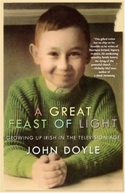
Japanese supporters sing their national anthem at a sports cafe in Tokyo at a public viewing of the FIFA World Cup group E match on June 25, 2010. Japan play against Denmark at the last match for the group match in South Africa.
John Doyle
The Globe and Mail
Published on Friday, Jun. 25, 2010
This is how it is here. See, the soundtrack in The Football Factory is reggae. Strictly so. If the game isn’t on – and games can be from any number of countries, most of the year – the music is reggae. It’s the way it is. Owner’s choice. Roots reggae. Pop reggae. Obscure, hard-thumping surreal reggae of the serious drugs variety. You notice it, and then you don’t.
It’s late Thursday afternoon, a day of warmth and dappled sunshine in Toronto. A group of young Japanese women are in the Factory, finishing their pints. They’ve had a few. And they are all slight, chic figures, looking just a little absurd waving their big pint glasses with their slim wrists. They clink them together, giggling. They are a little tipsy, and happy as the day is long. Behind them, on the wall, is a giant poster they probably don’t even notice. But I do. It features Bob Marley, toying with a soccer ball, over and over, in frame after frame. And it declares Marley’s famous phrase: “Football is part of I. When I play, the world wakes up around me.”
The afternoon hours have passed here in a glorious tangle of images, feelings, squeals, groans, and all manner of responsiveness. The Danes came first. Male, cocky, cheerful as they always are. Interested in beer. The game would soon begin. Group E: Japan against Denmark to determine who would follow the Netherlands into the last 16. At the last minute, some 60 or 70 Japan supporters arrived, en masse. No one knows why or how they found this place, of all the places to see the game. No one asks. They probably found it on the Internet and “Football Factory” sounded neutral, merely devoted to the game. Not some ex-pat hangout, a phony Irish or phony-English bar. This was a place to be.
If anyone stepped outside on the patios they’d have heard it, the distinct sound of Toronto in these dreamlike days – helicopters rattling in the skies, going this way and that, to little apparent purpose. The downtown core is emptying, caged in. G20 frenzy. Here, we are simultaneously aware and dismissive. Up the street, at the corner of Queen West and Bathurst, two maroon-coloured vans are parked. About 20 cops seem to have alighted. They stand round, to no apparent purpose. I notice that all the panhandlers, crack addicts and other street denizens seem to have disappeared. Except for one. He’s passed out on the sidewalk, a little ways east. He has no idea. Neither do the cops. And, anyway, nothing much matters except what’s unfolding here, in the bar. From a nearby alley comes the distinct odour of marijuana. It floats easily, if anyone even notices.
The Danes open strongly but, as in their other games, look decidedly unsteady in defence. Japan oozes confidence. Blithe indifference to the Danish threat is obvious. Two sublime goals from superbly taken free-kicks in the first half mean Japan has the game by the throat. The bottle-blond Japanese striker Keisuke Honda is electrifying. The ball bends and curls to his will. Japan looks utterly self-assured, uncaring about those tall Danes running around, chasing the ball. Each sweet movement is followed with gasps, squeals. The Danes, in the bar and on the field, looked bewildered. On and on it goes, this mad dance. Near the end, Denmark is awarded a penalty. Japan’s keeper stops it with aplomb. But the Danish striker Jon Dahl Tomasson meets the rebound and bundles it in. Hope for Demark. But for minutes only. Honda sashays into the Danish penalty area, makes a dunce of goalkeeper Thomas Sorensen and, all gentleman, passes to Shinji Okazaki to score. It’s done. The Danes are gone.
In the aftermath, the young Japanese men sit outside and smoke. They sit in a circle on the ground, away from the patio. No one ever sits there. They are as chic as the young women, all expensive denim and t-shirts. One wears a Japan team shirt on his head and manages to look avante-garde stylish doing it. Overhead, the helicopters go around and around, buzzing, rattling. Nobody pays any attention.
A minute’s walk away, the Prague Deli is near empty, but packed with lingering feel of hard ardor. A man sits in the window seat, drinking coffee. He’s been here for hours, smiling. Trying to sober up. The Prague is Czech, strictly speaking, but the Czechs and Slovaks had a soft, sweet divorce and the Slovaks hang out there for the tournament. Earlier, little Slovakia threw Italy out of the World Cup. Ten minutes walk north, College St. is subdued, perplexed, probably. I’m not going there. Neither is the man steadily drinking coffee and smiling at the world. The Slovak victory spilled onto Queen St. earlier, a great wave of delight you could taste. You could still sense it, hours later. Police cars go by, one after another after another, oblivious.
Back at The Football Factory, the last glasses clink, to the sound of easy laughter. The reggae starts up. Bob Marley’s face gazes down as the last of the Japanese ladies leave. I write down the words, to ensure I remember: “Football is part of I. When I play, the world wakes up around me.”
The helicopters are in the sky, buzzing, droning, still. No one looks up. The police cars go by. No one looks. This is how it is here.


